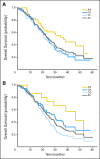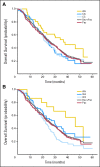Association of vascular endothelial growth factor and vascular endothelial growth factor receptor-2 genetic polymorphisms with outcome in a trial of paclitaxel compared with paclitaxel plus bevacizumab in advanced breast cancer: ECOG 2100
- PMID: 18824714
- PMCID: PMC2653128
- DOI: 10.1200/JCO.2008.16.1612
Association of vascular endothelial growth factor and vascular endothelial growth factor receptor-2 genetic polymorphisms with outcome in a trial of paclitaxel compared with paclitaxel plus bevacizumab in advanced breast cancer: ECOG 2100
Erratum in
- J Clin Oncol. 2009 Jun 20;27(18):3070
Abstract
Purpose: No biomarkers have been identified to predict outcome with the use of an antiangiogenesis agent for cancer. Vascular endothelial growth factor (VEGF) genetic variability has been associated with altered risk of breast cancer and variable promoter activity. Therefore, we evaluated the association of VEGF genotype with efficacy and toxicity in E2100, a phase III study comparing paclitaxel versus paclitaxel plus bevacizumab as initial chemotherapy for metastatic breast cancer.
Patients and methods: DNA was extracted from tumor blocks of patients from E2100. Three hundred sixty-three samples were available to evaluate associations between genotype and outcome. Genotyping was performed for selected polymorphisms in VEGF and VEGF receptor 2. Testing for associations between each polymorphism and efficacy and toxicity was performed.
Results: The VEGF-2578 AA genotype was associated with a superior median overall survival (OS) in the combination arm when compared with the alternate genotypes combined (hazard ratio = 0.58; 95% CI, 0.36 to 0.93; P = .023). The VEGF-1154 A allele also demonstrated a superior median OS with an additive effect of each active allele in the combination arm but not the control arm (hazard ratio = 0.62; 95% CI, 0.46 to 0.83; P = .001). Two additional genotypes, VEGF-634 CC and VEGF-1498 TT, were associated with significantly less grade 3 or 4 hypertension in the combination arm when compared with the alternate genotypes combined (P = .005 and P = .022, respectively).
Conclusion: Our data support an association between VEGF genotype and median OS as well as grade 3 or 4 hypertension when using bevacizumab in metastatic breast cancer.
Figures




Comment in
-
Race to report: are vascular endothelial growth factor genetic polymorphisms associated with outcome in advanced breast cancer patients treated with Paclitaxel plus bevacizumab?J Clin Oncol. 2009 Mar 10;27(8):1342; author reply 1342-3. doi: 10.1200/JCO.2008.20.6359. Epub 2009 Feb 2. J Clin Oncol. 2009. PMID: 19188671 No abstract available.
References
-
- Schneider BP, Sledge GW Jr: Drug insight: VEGF as a therapeutic target for breast cancer. Nat Clin Pract Oncol 4:181-189, 2007 - PubMed
-
- Hurwitz HI, Fehrenbacher L, Hainsworth JD, et al: Bevacizumab in combination with fluorouracil and leucovorin: An active regimen for first-line metastatic colorectal cancer. J Clin Oncol 23:3502-3508, 2005 - PubMed
-
- Monk BJ, Han E, Josephs-Cowan CA, et al: Salvage bevacizumab (rhuMAB VEGF)-based therapy after multiple prior cytotoxic regimens in advanced refractory epithelial ovarian cancer. Gynecol Oncol 102:140-144, 2006 - PubMed
-
- Sandler A, Gray R, Brahmer J, et al: Randomized phase II/III trial of paclitaxel (P) plus carboplatin (C) with or without bevacizumab (NSC #704865) in patients with advanced non-squamous non-small cell lung cancer (NSCLC): An Eastern Cooperative Oncology Group (ECOG) Trial E4599. J Clin Oncol 23:2s, 2005. (suppl; abstr LBA4)
Publication types
MeSH terms
Substances
Grants and funding
LinkOut - more resources
Full Text Sources
Other Literature Sources
Medical

